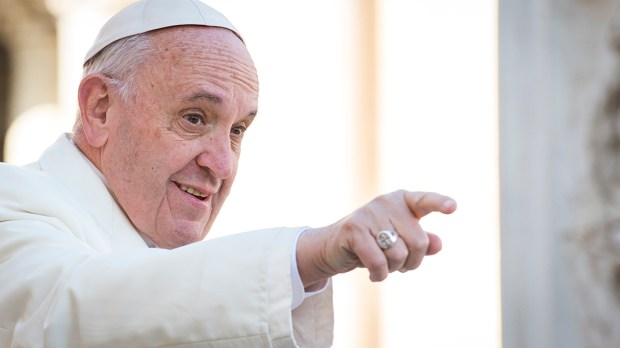Pope Francis arrived by surprise, in his blue Ford Focus, on Via Alessandria in the Salario neighborhood of Rome last Friday, to meet with an elderly woman he was acquainted with. She was unable to leave her house because of ill health, but she had requested several times to meet with him.
“The visit lasted about an hour, and when Pope Francis went back down to the street, he met a small group of residents, who welcomed him and greeted him with the usual affection. He shook everyone’s hand, and gave out hugs and smiles. In particular, the pope stopped to play with a child, while a young woman, seeing him, was unable to hold back her tears of emotion.
“Another man gave him a small crucifix. Alerted to the Holy Father’s presence, a sick man who lives in the same building as the elderly woman went to him to receive consolation and to ask for prayer, which the pope promised him. Back in the car, Francis continued to greet those present, blessing them.” (Ansa)
The pope likes to improvise like this, not for the pleasure of shaking up the tranquility of this or that neighborhood, but because he always wants to make those who need it feel his presence close to them, as best he can.
He did the same thing recently with one of his close collaborators: the new Polish cardinal Konrad Krajewski, who serves as the Papal Almoner — the Holy Father’s direct channel to those in need.
“Francis arrived by surprise. ‘I came for the poor, not for you,’ he said smiling to Fr. Konrad, who asks to continue to be called this way, despite his red biretta.” (Aleteia)
Sometimes it’s a phone call
Bergoglio began with his phone calls immediately after his election as pontiff, offering consolation and comforting words to those in need, or even just a greeting, perhaps after having been contacted through a letter. Other times, it’s to keep up the normality of his previous life, one of the motives that dissuaded him from occupying the papal apartments, inspiring him to choose the accommodations of Domus Sanctae Marthae instead, where he would be accompanied by the comings and goings of this hotel-type residence.
“‘We laughed and joked for about eight minutes,’ says Stefano Cabizza, who in 2013 was 19 years old. ‘He called me at about 5 p.m., after not finding me at home the first time. He told me to speak to him using the informal ‘tu’ [the form of “you” used with friends and equals in Italian, Ed.], saying to me, ‘Do you think the Apostles used ‘Mr.’ when they talked to Jesus? Or that they called him ‘your excellency?’ They were friends, as you and I are now, and I’m accustomed to deal informally with my friends.’ And he asked me to pray a lot to St. Stephan and also to pray for him. He gave me his blessing and I felt great strength grow within me. Certainly, it was the most beautiful day of my life.’” (Aleteia)
His phone calls are not just about a greeting and saying thank you. On these occasions (and perhaps in others not made public) there is also a part of his priestly ministry. Such is the story of Anna, pregnant by a man who was already known not to be willing to acknowledge the baby. Francis, as a pastor, answered the letter he received from her, calling the woman who was planning on having an abortion:
“‘Hello Anna, this is Pope Francis. I read your letter. We Christians shouldn’t lose hope. A baby is a gift from God, a sign of Providence.’ ‘His words filled my heart with joy,’ Anna recounts. ‘He told me that I was very brave and strong for my baby.’”
There are also announcements, specifically when he can give good news to an entire community, such as when Francis called Fr. Piergiorgio Rizzini, pastor of St. George in Braida, who recounts the pope’s promise (which he later kept) to talk another time about those “inconvenient” priests whose style is so similar to that of Bergoglio:
“I heard the first words … ‘This is Pope Francis,’” says Don Piergiorgio to the web TV of the news outlet of Verona. “Of course, I had a moment of confusion, but also of surprise and emotion. Then the conversation began. I had sent him a letter in which I thanked him for his attention towards Fr. Mazzolari and Fr. Milani. For us,” continues the pastor of St. George’s parish, “priests from the 1970s were an important reference point. And we think that they can be reference points for future priests as well. The pope then started to talk about some rigid attitudes present in the Church.”

